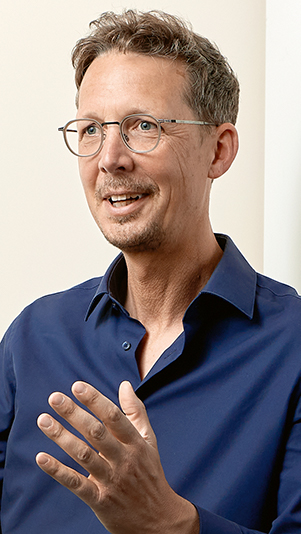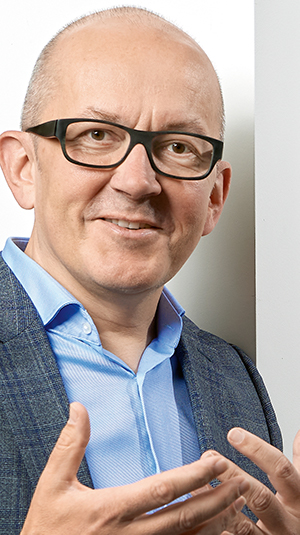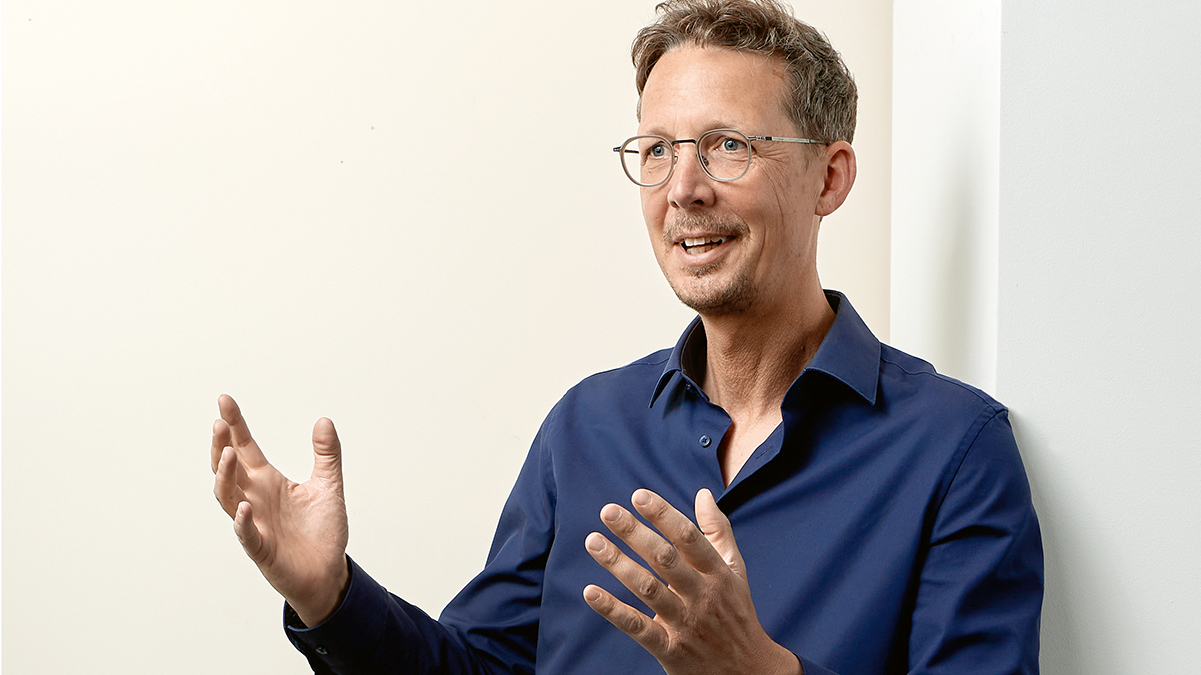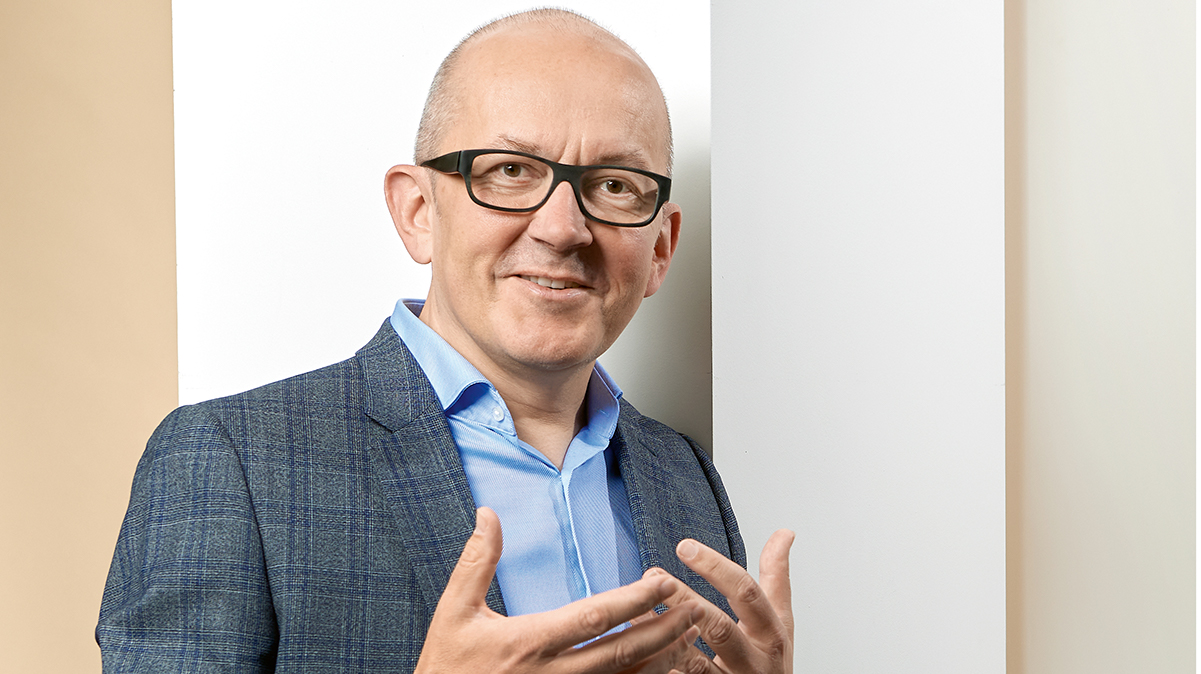“Embracing Diversity of Opinion”
Covid-19 was a disaster waiting to happen, as scientists have been warning about new epidemics for years. Yet politicians were blindsided and deployed a Science Task Force, which, incidentally, was instigated by researchers. Institutionally speaking, is the science community sufficiently involved in policymaking in Switzerland?
Michael Hermann: I would turn that question around. While yes, it’s true that some researchers had warned of a pandemic, the science community was also taken by surprise. This was reflected in the allocation of research funds – viral diseases were not a hot topic before Covid. Like policymakers and society, researchers also first needed to grasp the significance of the pandemic.
Flurin Condrau: You could also say that Switzerland was quite well prepared as – unlike many other countries – it had a pandemic preparedness plan in place early on. But implementation from March 2020 onward was pure improvisation. This also applies to the way in which the Science Task Force was set up, with politicians failing to oversee a clear and orderly process and ensure the right structure of the committee, which apparently was initially set up against the will of the Federal Office of Public Health FOPH. Some disciplines were also forgotten at first, such as palliative care. The unconventional way the committee was set up certainly didn’t bring much stability to official communication. Even now, the exact role of the Task Force is unclear.
Hermann: Exactly. This once-in-a-generation event forced the whole of society to improvise like never before. Collaboration between scientists and policymakers also had to be learned. In normal times, these spheres are clearly separate and don’t interact directly; working together and exchanging ideas initially required practice. So, for example, many researchers communicated through the media instead of approaching the relevant officials, which provoked a public debate and caused defensiveness in political circles.
By the same token, policymakers were unwilling to make use of scientific channels. That surprised me. If they had talked to each other directly earlier on, there would have been fewer conflicts. In a small country like Switzerland, with its culture of democracy, I find it staggering that these two worlds can be so hermetically distinct. There’s a lot of room for improvement here.
According to Michael Hermann, science and politics are separate spheres. Do you agree, Flurin Condrau?
Condrau: I wouldn’t say that science and policymaking are intrinsically separate. Even the way sciences are organized is clearly a political process. Our health system – the promotion of intensive therapeutic medicine, for example – is a product of policy and science, as is the neglect of the field of public health, which has been kept on the back burner. This division became particularly apparent in decision-making on policy measures. We saw how some policy decisions were made with almost no involvement of the experts. Obviously that is fatal during a pandemic. For example, if you don’t know what exponential growth means and are making policy decisions on lockdown easing, things quickly get tricky.
Hermann: But I would direct criticism back at the science community. Sure, exponential growth is difficult to explain. But what I’ve found irritating is the somewhat patronizing attitude of scientists towards policymakers – this claim that they know best. The way scientists think is very disciplinary and this is encouraged by the publication culture. They tend to be very self-centered and have clear views about what is right and wrong, which they try to apply to policy. But in politics there is no right way, where all the problems are solved, and no wrong way where everything fails.
I think there needs to be more permeability, more humility – policymakers also have expertise, and they know more than scientists about selling things to the public and implementing them. There needs to be more mutual trust and respect.
How can collaboration be improved?
Hermann: It’s less about getting more scientists to sit in parliament, and more about permeability between the two spheres. There needs to be more engagement and better communication. The pandemic is also an opportunity for the science community, with many people only recognizing its importance in the face of this threat. In fact, this is a perfect opportunity for a public relations campaign on the role of science and research.
Condrau: I guess I’ve benefited from the pandemic in a way. (Laughs) As a medical historian, I’ve gotten a lot of public attention. And I absolutely agree that taking the 19th century view of science and saying that we’ve decided this or that and this is how it must be done is not the right approach. Conversely, it’s true that there is great diversity of opinion within the science community. Science is not a single discipline; there is vast specialization. So the question is who do you talk to and who do you want to listen to?
Who should have been more involved?
Condrau: My greatest regret regarding the pandemic is that we’ve carried out far too little research into public health here in Switzerland in recent decades. We’re now paying quite a high price because although there are lots of voices speaking out publicly, we don’t have any real leading public health figures like other countries. I’m thinking, for example, of the likes of Professor Devi Sridhar in Scotland, an expert in global and public health, who has been very clear in her arguments since the beginning of the pandemic and has had an incredible response. Or Anthony Fauci in the United States, an experienced communicator and public health scientist. Part of the problem is that even before the pandemic, we missed the opportunity here in Switzerland to raise public awareness about the field of public health.
Hermann: We now have an opportunity to build on the crisis and develop these areas. That would be a lesson for the science community – that things are now possible that aren’t normally. In a crisis, perceptions shift – situations are re-evaluated and structures are broken down. Now is the time to think ahead to beyond the pandemic and to consider how public awareness could be utilized for these goals. On this point, once again I’m amazed at how unpolitical many scientists are, and that they’re rooted in this current debate rather than thinking strategically about the future. Because that is what’s actually needed right now.
What could science bring to policymaking?
Hermann: We’ve already talked about public health. We could try setting up structures like the Science Task Force for other issues. And we need to think about how we can bring scientists and policymakers closer together within the Federal Office of Public Health (FOPH).
Condrau: You might be left wondering how health policy works here in Switzerland. Who actually still understands it? Reforms and mini reforms are shot down by lobby groups before they have even been seriously debated. There is a lack of transparency around lobbying in public life and in parliaments, and lobbyists use other channels. Last fall, it was joked that every lobbyist had Federal Councilor (responsible for health) Alain Berset’s cellphone number, but that he didn’t have the numbers of any of the key scientists who could advise him.
Hermann: It’s pretty amazing that the Swiss science community is nationally and internationally well connected, but when it comes to the public, it is mainly the media that is seen as relevant. But those who are often in the media don’t yet have the ear of the Federal Council. Scientists need to invest more in building personal relationships with decision-makers. Only a very small number have understood this and do it. A key way of exerting influence would be to get access to the decision-makers behind the scenes at the right moment. Top-heavy, scientifically balanced expert committees that publish polished statements are not so helpful.
Condrau: But that goes against the nature of researchers. This sort of political networking is greatly underestimated. What’s more, you quickly come across as a bit suspicious if you appear too often in the media. Many don’t want that.

Hermann: But media publicity is still seen as important. That’s amazing actually. On the one hand, you have this skepticism of publicity in scientific circles, while on the other, many scientists secretly covet the idea of having a public presence. It’s often forgotten how important networking is.
There has been criticism and polemic leveled at the Science Task Force. One of the things that has come under fire is that its members publicly express their views and criticize the Federal Council. Is there anything wrong with criticizing the government like this?
Condrau: As long as I’m aware of the mandate, there is absolutely no reason for me to shake the principle of peoples’ freedom of expression. Whether what they say is always smart is another matter. There have been a number of statements made by scientists that may have been somewhat questionable. But this doesn’t bother me – it’s important we embrace diversity of opinion.
What I find more of an issue is the FOPH’s overall unsatisfactory crisis communication in Switzerland. I must say I’m astonished when I compare it with the same office’s communication on HIV and AIDS in the 80s and 90s. Switzerland’s communication on AIDS was internationally renowned, but nobody will want to imitate its coronavirus communication.
Hermann: Let me add something here: A crisis can’t be tackled with a communication campaign. What we’re experiencing at the moment is much more far-reaching than HIV and AIDS. It’s interesting that in our surveys for the Swiss public broadcaster SRG, the vast majority of the public say they think it’s right that researchers are able to speak freely. They don’t want to see them silenced. Much of this debate has been fueled by the political system, with politicians either siding with or against the scientific community and using it for party political gain.
You can consider trust as a yardstick for good communication. According to the surveys, trust broke down last fall. Since the Federal Council has started showing more consistent leadership and bowing less to pressure, trust has increased again. I’m actually really impressed with our system’s ability to adapt.
Condrau: I’ve also noticed that since February of this year, the Federal Council has started developing a strategy, but it took them a year to do so. This strategy is the basis for clearer messaging and communication. But its pandemic policy still lacks a clear objective. However, it’s still too early to assess the feasibility of the political system in light of this crisis. Essentially, many people have recognized that a crisis requires leadership, but Switzerland has an ambivalent relationship with its leaders, and is skeptical of the ruling elite.

We’re seeing how the pandemic keeps evolving in ways we hadn’t predicted. In your view, how have scientists and policymakers dealt with this uncertainty?
Hermann: It has always been a problem when scientific predictions are too absolute and then don’t come true. It’s important to communicate uncertainty, too – it doesn’t undermine what scientists have to say. There’s definitely room for improvement here.
Condrau: Basically, there has to be a certain margin of error; we can’t expect perfection. This applies as much to the political process as to science. Interaction between scientists and policymakers is complicated by the fact that scientists frequently produce nuanced analyses, while policymakers want clear and unequivocal results. This to me is a weakness of scientists – that they seek to engage in public debate using scientific discourse. I’m not sure that can work.
Hermann: I wouldn’t draw such a clear distinction between the “analytical” science community and “unequivocal” policymakers. There are also policymakers, especially in executive roles, who express very balanced and measured opinions. Meanwhile, some scientists post very populist tweets. Social media incites overly emotional and direct statements, to which even scientists are not immune.
Should researchers hold back from posting on social media?
Condrau: No, why? It doesn’t matter if they sometimes stoke emotive debates; they’re only human after all. We can talk about the value of social media to society. But I absolutely don’t see on what basis we should ban anyone from using these channels.
Hermann: I do think that people sometimes lack self-control. They need to be very aware of the platform they’re using, what it means for the perception of scientists, and how quickly a tweet can find its way into the media. But I don’t think regulation is the way to go.
During the pandemic, politicians repeatedly painted a picture of an expertocracy, a dominance of science over policy. You obviously don’t see this danger.
Hermann: No, and scientific experts have not been politically smart in the way they have responded to this.
Condrau: An expertocracy wouldn’t even work in an authoritarian state like China. But it certainly makes sense during a pandemic to listen more carefully to the experts who have been studying pandemics for years. I’m thinking of the virologists who have studied past outbreaks, such as Sars, swine flu and Ebola. Society in Switzerland has yet to fully accept that we have to prioritize tackling the current crisis and that political power struggles will have to wait. The crisis is not yet over.
Flurin Condrau, professor of the history of medicine
Michael Hermann, social geographer, political scientist and
Director of Sotomo
This conversation on the COVID pandemic was first published in the UZH Journal.

